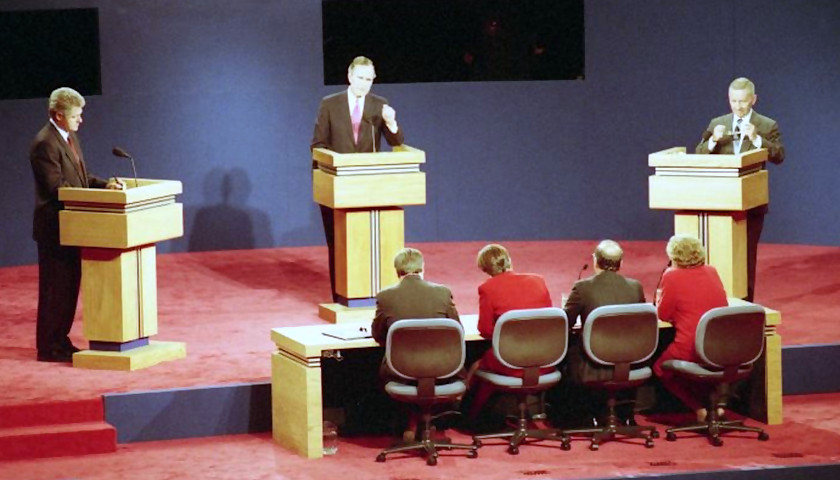by Robert Romano
Any Republican supporting a primary challenge against President Donald Trump for the Republican nomination in 2020, if it is successful or even if it just hampers the primary process, is virtually guaranteeing the next president will be a Democrat.
And with it, Democrats will once again have all the trappings of the presidency, including nominating the next Supreme Court justices, signing laws and conducting foreign relations.
In modern U.S. history of presidential elections since the nation’s first political primaries in 1912, no sitting president has ever been denied his party’s nomination at a nominating convention whilst standing for reelection. 2020 will be no different, wherein the Republican nominee for president will almost certainly be Donald Trump once again.
Here’s another feature of those contests: Every single one of the one-term presidents of the 20th Century — William Howard Taft in 1912, Herbert Hoover in 1932, Gerald Ford in 1976, Jimmy Carter in 1980 and George H.W. Bush in 1992 — all faced strong primary challenges.
Harry Truman and Lyndon Johnson both withdrew their candidacies from the elections of 1952 and 1968 respectively in the face of strong primary challengers. Truman lost the 1952 New Hampshire primary and Johnson barely won the 1968 New Hampshire primary. One can quibble about whether these count as being ousted or not but they were not on the ballots at the conventions because they were not contesting the conventions at that point. They forfeited. Both conventions ended up being brokered, with none of the prime vote-getters in the primaries obtaining the nomination.
Dwight D. Eisenhower and Richard Nixon both won the contests for open seats vacated by the incumbent presidents in 1952 and 1968, respectively.
As for the other one-termers, Taft was defeated by Woodrow Wilson after gaining fewer votes than Theodore Roosevelt in the 1912 primaries, Herbert Hoover was defeated by Franklin Roosevelt after gaining fewer votes than Joseph France in the 1932 primaries, Gerald Ford lost to Jimmy Carter after beating Ronald Reagan in the contested 1976 primaries, Jimmy Carter lost to Ronald Reagan after beating Ted Kennedy in the contested 1980 primaries and George H.W. Bush lost to Bill Clinton after beating Pat Buchanan in the contested 1992 primaries.
In every one of these instances, the opposition party won. 100 percent of the time, every single time. It’s a great way to lose.
Moreover, the years there were significant primary challenges and the one-term president was ousted, the opposition party fared very well in down-ballot congressional races. In 1912, 1932, 1976 and 1992, Democrats won the trifecta of the presidency, the House and Senate. In 1952, Republicans won the presidency, House and Senate, and in 1980, Republicans won the presidency and the Senate, and picked up seats in the House. The outlier is 1968, where Republicans won the presidency but only made gains in the House and Senate.
Now, not all primary challenges are fatal. Oftentimes, they are inconsequential insofar as incumbents face no-name challengers on the ballot but almost nobody votes for them. And with 86 percent approval among Republicans for example in the latest Politico tracking poll, Trump might not have much to worry about at the moment. So, there could be a challenge and perhaps Trump simply wipes the floor with them in the primary while Democrats have a close primary and so Trump actually goes on to win the general election with momentum.
That’s the lesson of modern political history. Incumbent presidents who run relatively unopposed for their party’s nomination tend to get reelected. Period.
Making such a gambit an unnecessary risk for the GOP, even if they were worried about this or that poll, which at 15 months out from the election are meaningless at this stage of the game. The bottom line is if Republicans want to hold the White House and not suffer damage in congressional races, Trump is their best bet.
This where true believers will contend with predictable hand wavery like the loser at the casino, “But this time is different!”
No, it’s not.
When it comes to 2020, whether talking about Joe Walsh or William Weld or whoever else foolishly tosses their hats in the ring on the Republican side, likely all a primary challenge would do is fail and potentially weaken the incumbent Trump. That will increase the odds dramatically Democrats win the next election and choose the next Supreme Court justices, probably would have down-ballot implications as well, winning Congress and passing the Green New Deal, socialized medicine, universal income and the rest of their political program.
All of which make such a primary challenge of Trump ill-advised, that is, if Republicans are in the business of winning elections.
– – –
Robert Romano is the Vice President of Public Policy at Americans for Limited Government.





[…] Source: theminnesotasun.com […]